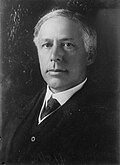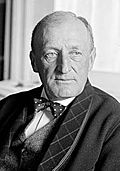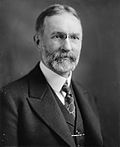Top Qs
Timeline
Chat
Perspective
List of United States Supreme Court cases, volume 268
From Wikipedia, the free encyclopedia
Remove ads
This is a list of cases reported in volume 268 of United States Reports, decided by the Supreme Court of the United States in 1925.
Remove ads
Remove ads
Justices of the Supreme Court at the time of volume 268 U.S.
Summarize
Perspective
The Supreme Court is established by Article III, Section 1 of the Constitution of the United States, which says: "The judicial Power of the United States, shall be vested in one supreme Court . . .". The size of the Court is not specified; the Constitution leaves it to Congress to set the number of justices. Under the Judiciary Act of 1789 Congress originally fixed the number of justices at six (one chief justice and five associate justices).[1] Since 1789 Congress has varied the size of the Court from six to seven, nine, ten, and back to nine justices (always including one chief justice).
When the cases in volume 268 were decided the Court comprised the following nine members:
Remove ads
Notable Cases in 268 U.S.
Summarize
Perspective
Linder v. United States
Linder v. United States, 268 U.S. 5 (1925), involved the applicability of the Harrison Act. The Harrison Act was originally a taxing measure on drugs such as morphine and cocaine, but later effectively became a prohibition on such drugs. The Act, however, had a provision exempting doctors who prescribed the drugs. Dr. Charles Linder prescribed the drugs to addicts in Oklahoma, which the federal government said was not a legitimate medical practice. He was prosecuted and convicted. Linder appealed, and the Supreme Court overturned his conviction, holding that the federal government in this case had overstepped its power to regulate medicine.
Pierce v. Society of Sisters
In Pierce v. Society of Sisters, 268 U.S. 510 (1925), the Supreme Court overturned an Oregon statute requiring children to attend only public schools. The decision significantly expanded coverage of the Due Process Clause of the Fourteenth Amendment to the United States Constitution to recognize personal civil liberties. The decision has been cited as a precedent in numerous later cases. The right of parents to control their children's education without state interference became a "cause célèbre" following the case, and religious groups still defend this right from state encroachment.
Gitlow v. New York
Gitlow v. New York, 268 U.S. 652 (1925), is a landmark decision, in which the Supreme Court held that the Fourteenth Amendment to the United States Constitution had extended the First Amendment's provisions protecting freedom of speech and freedom of the press to apply to the governments of U.S. states. Along with Chicago, Burlington & Quincy Railroad Co. v. City of Chicago (1897), it was one of the first major cases involving the incorporation of the Bill of Rights. It was also one of a series of Supreme Court cases that defined the scope of the First Amendment's protection of free speech, and established the standard to which a state or the federal government would be held when it criminalized speech or writing.
Remove ads
Citation style
Summarize
Perspective
Under the Judiciary Act of 1789 the federal court structure at the time comprised District Courts, which had general trial jurisdiction; Circuit Courts, which had mixed trial and appellate (from the US District Courts) jurisdiction; and the United States Supreme Court, which had appellate jurisdiction over the federal District and Circuit courts—and for certain issues over state courts. The Supreme Court also had limited original jurisdiction (i.e., in which cases could be filed directly with the Supreme Court without first having been heard by a lower federal or state court). There were one or more federal District Courts and/or Circuit Courts in each state, territory, or other geographical region.
The Judiciary Act of 1891 created the United States Courts of Appeals and reassigned the jurisdiction of most routine appeals from the district and circuit courts to these appellate courts. The Act created nine new courts that were originally known as the "United States Circuit Courts of Appeals." The new courts had jurisdiction over most appeals of lower court decisions. The Supreme Court could review either legal issues that a court of appeals certified or decisions of court of appeals by writ of certiorari. On January 1, 1912, the effective date of the Judicial Code of 1911, the old Circuit Courts were abolished, with their remaining trial court jurisdiction transferred to the U.S. District Courts.
Bluebook citation style is used for case names, citations, and jurisdictions.
- "# Cir." = United States Court of Appeals
- e.g., "3d Cir." = United States Court of Appeals for the Third Circuit
- "D." = United States District Court for the District of . . .
- e.g.,"D. Mass." = United States District Court for the District of Massachusetts
- "E." = Eastern; "M." = Middle; "N." = Northern; "S." = Southern; "W." = Western
- e.g.,"M.D. Ala." = United States District Court for the Middle District of Alabama
- "Ct. Cl." = United States Court of Claims
- The abbreviation of a state's name alone indicates the highest appellate court in that state's judiciary at the time.
- e.g.,"Pa." = Supreme Court of Pennsylvania
- e.g.,"Me." = Supreme Judicial Court of Maine
Remove ads
List of cases in volume 268 U.S.
Remove ads
Notes and references
External links
Wikiwand - on
Seamless Wikipedia browsing. On steroids.
Remove ads











